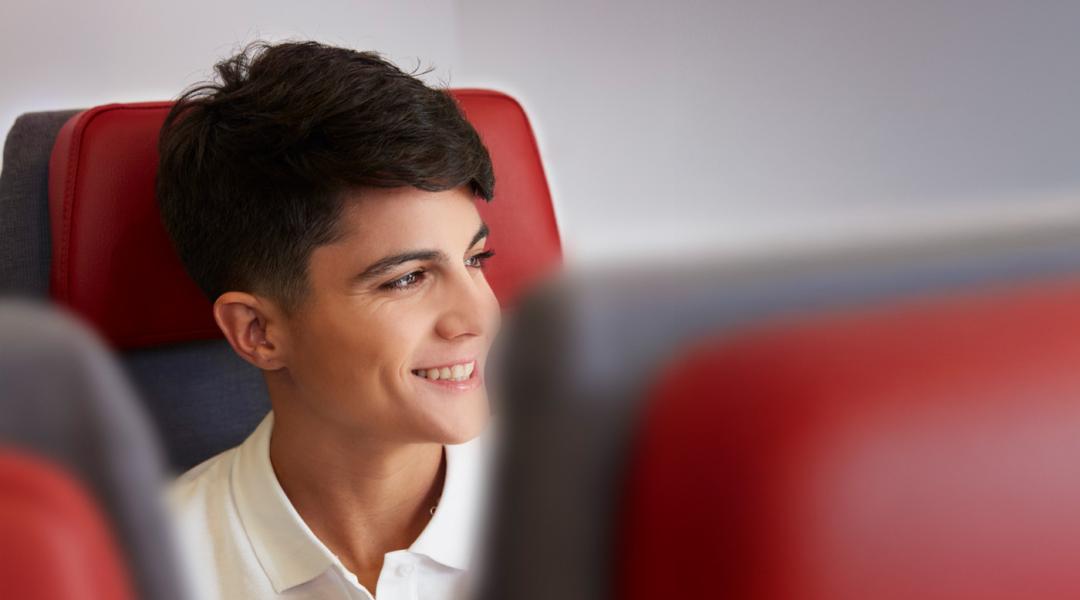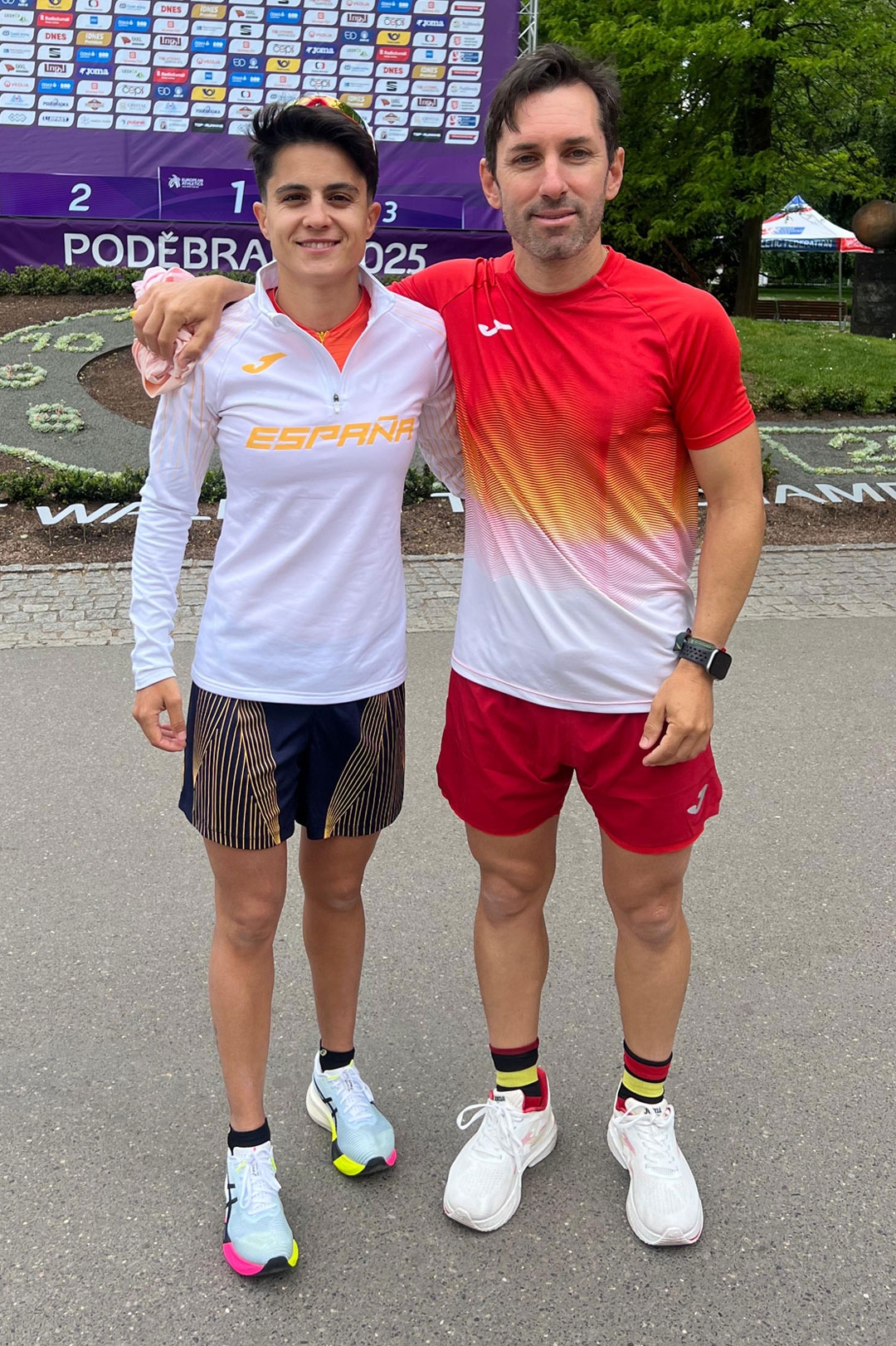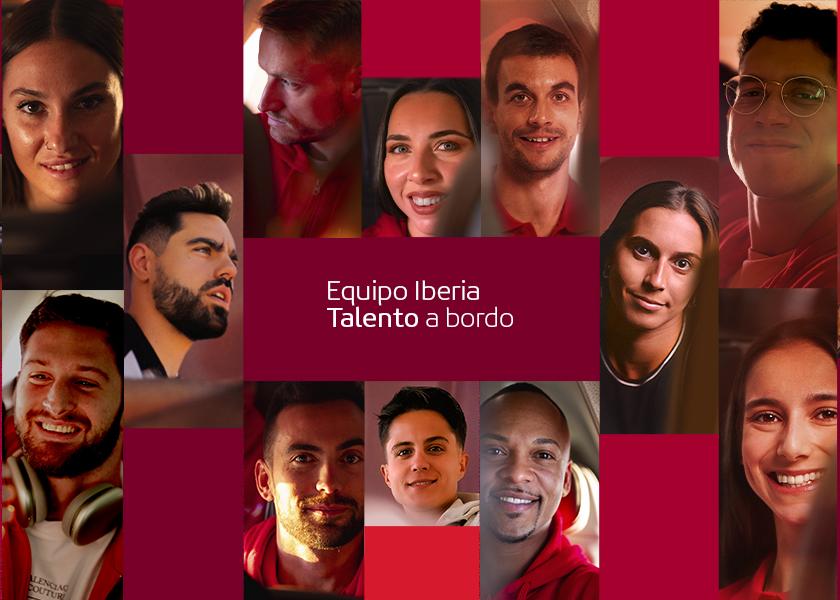María Pérez
The queen of race walking

At the Paris Games, María Pérez became the first Spanish athlete to achieve the triple crown, that is, the European, World and Olympic gold medals. An outstanding addition to the Iberia Talento a bordo Team for the Los Angeles Games. Before that, this race walker dreams of winning gold again at the Tokyo World Championships (in the 20-km and 35-km categories) which she conquered a couple of years ago at the Budapest World Championships.
With the Eiffel Tower bearing witness, María Pérez (Orce, Granada, 1996) won the gold medal in the mixed relay category at the Paris Games. As she crossed the finish line, she gave a shout—both of joy and rage—which awoke half the French capital, and fell into the arms of Álvaro Martín, her teammate and friend. It was her second medal after winning silver the week before in her favourite category, the 20-km race. A small vendetta against those who said she couldn’t do it: “At the beginning, I was told that I wasn’t going to be good at race walking. I’ve fought to prove to those people that everyone is talented and you can do anything with hard work. Talent has a lot to do with working for what you want.” A year later, we chat to María—who recently joined the Iberia Talento a bordo Team—a few days before she takes part in the Tokyo World Championships (13th-21st of September), where she hopes to repeat her success winning the two gold medals she achieved in Budapest in 2023. She will be running without Álvaro, who retired at the age of 30 not long after returning from Paris to become a business lawyer. A decision María understands because she’s also concerned about her future employment. “When we retire, we lack work experience because we’ve invested our time in the sport. In other countries, athletes receive greater incentives when they achieve great results. In Italy or France, for example, they become civil servants. It’s a way of thanking them for everything they’ve done for their country.” But let’s get back to athletics…
You’ve just won the 10-km race walking Spanish Championship, smashing your personal best. At the doors of the World Championships, would you say you’re at your best?
I cannot say, but I assure you that after the Games, I’ve carried on training and competing really well. I’ve also avoided injuring myself—touch wood because it’s been tough in the past—. The Spanish Championship was a good test for the World Championships. In Tokyo, the distances will be inverted, first we’ll run 35 km and then 20 km. It’s a challenge that I’ve been obsessed with all of this year and I’m really excited. In any case, if I had to choose, I’d rather be at my best at the Los Angeles Games.
In Tokyo, you’re going to defend the gold medals you won in Budapest. Does this make you feel more or less pressure?
The truth is that, after my success in Budapest, I feel less pressure. I’m realizing that without pressure, I can enjoy myself more and I’m more excited. I’ll give both the 35-km and 20-km races my all, but I’m aware of the fatigue that running 35 km first will cause me. I’m more nervous about that than about defending both titles. I’m going to push my body to the limit like never before and I hope it responds well. The good thing is that we have seven days in between to recover; in Budapest we only had 22 hours in between the 20-km and 35-km races.
Race walking is affected by other variables that are outside of athletes’ control. For the World Championships in Tokyo, what are you worried about the most?
First, that we’re not machines; we’re human beings and sometimes you feel good and other times you don’t. The climate is going to be very different to the one in Budapest—or Paris—; hotter and more humid. Since we’re competing outside of Europe, we also have to take jet lag into account. Our bodies suffer with these changes. Then there’s the risk of being disqualified. Technique is crucial for race walkers because it all depends on how the judges see you during the circuit. How they judge this time isn’t really on me, but I feel calm because we’re training well.
“It was destiny that two athletes from empty rural Spain made their dream come true together”
A year ago, you made history at the Paris Games by winning two medals and becoming the flag bearer during the closing ceremony. What memories come to mind?
They were the happiest days of my life… The reward for a lot of hard work, a lot of effort, and a lot of time spent far away from home. It will be hard to outdo those Games. Each medal is special, but my Paris medals even more so because I was racing against time because of an injury [a sacral stress fracture]. Also, because I won a medal alongside Álvaro Martín, my teammate and friend. It was destiny that two athletes from empty rural Spain made their dream come true together. I also had my friends and family, and so many Spaniards cheering me on.
After your success, you and Álvaro Martín became the hit couple in Paris. How did you feel when he announced he was retiring?
Álvaro almost told me over breakfast at the villa, but people were constantly coming up to us and he didn’t have the chance. So, I found out at the same time as everyone else, on the 7th of September. It’s hard to express how I felt. That day, he looked at me with tears in his eyes and told me: “María, I’m going to say something you’re not going to like.” I asked him several times to stay, even though I had no right to. I think he’s taken a wise decision, and I hope he becomes the best business lawyer in Spain. Wherever he is, he has my upmost support, although selfishly I would have loved to have him by my side for longer.

Race walker María Pérez with her long-time coach, Daniel Jacinto Garzón. © Cedida por María Pérez
Race walking has always won this country plenty of medals; do you think Spain is particularly good at shaping talent in your discipline?
Race walking is always in good health in Spain. Not only thanks to athletes, but also the coaches who shape that talent. I am who I am thanks to my coach. In the senior category, we have a wonderful team and young people keep joining. This is good for us veterans because they tighten our screws, they make us more competitive, and that’s the essence of this sport. We feed and learn from each other. I’m sure that when I leave the team, I’ll continue to see plenty of success from my living room sofa.
Since your beginnings with race walking, you’ve always worked with the same coach: Daniel Jacinto Garzón. Which is the key to such a long relationship?
In race walking, it’s odd to always have the same coach, but by 2028 I’ll be lucky to celebrate 20 years alongside Daniel. Our relationship is different, more than athlete-coach we’re family because I went to Guadix with him at the age of 15 and I have more respect for him than my parents. Even though we sometimes argue and I say: “This is worse than being married” (laughs). In the end, he’s the person I spend the most time with throughout the year and communication is important. He’s calm and I’m more jittery; opposites attract. We work well together and our success lies in that we’ve never got too comfortable.
“Race walking is always in good health in Spain. Not only thanks to athletes, but also the coaches who shape that talent”
Race walking has been under intense scrutiny for years, even called into question. Sometimes it seems like the ugly duckling of athletics. Does this infuriate you?
Yes, it makes me furious. Race walking is, together with the marathon, two of the oldest disciplines. The latest decisions affect Spain a lot because they reduce our chances of winning a medal. The ones who suffer the most are us athletes and our coaches, because this is no way to live. It also creates stress and can lead to injuries. It also has financial repercussions for the Federation. It’s baffling, but it doesn’t depend on me or the results I achieve. It’s a debate that’s above our heads.
What advice would you give young people to persevere in such a demanding discipline as race walking?
We need to tell young people to fight for their dreams and to never give up. That’s what has made me be where I am today. No one can tell you that you’re not capable of achieving things. We cannot let people step or walk all over us. No matter how many stones you encounter along the road, if you set yourself a goal, you’ll get around them and push forward. There’s only one person who can defeat us and that’s ourselves. The beauty lies in not giving up and continuing to fight to grow, both personally and in terms of the sport. My other tip is to never stop studying.
There’s life beyond athletics, right? In fact, you studied Early Childhood Education; are children your other great passion?
I have a soft spot for children. I love them. I think we each have a purpose in this world, and mine, apart from race walking, could be that. Even though it’s hard to admit it because we spend 24/7 on it, there’s life beyond the sport. There also comes a point when we have to decide that this is the end, and I would love to convey to the youngest members of our society everything that I’ve learnt from sport: hard work, sacrifice, perseverance, humility…


